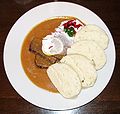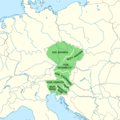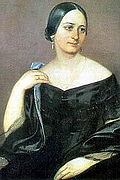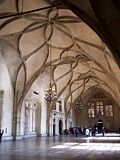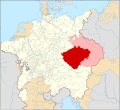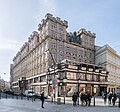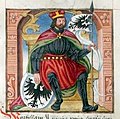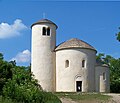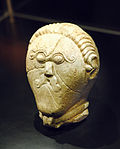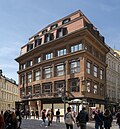Portal:Czech Republic
Welcome to the Czech Portal!
Vítejte na Českém portálu!

|

|

| |
The Czech Republic, also known as Czechia, and historically known as Bohemia, is a landlocked country in Central Europe. The country is bordered by Austria to the south, Germany to the west, Poland to the northeast, and Slovakia to the southeast. The Czech Republic has a hilly landscape that covers an area of 78,871 square kilometers (30,452 sq mi) with a mostly temperate continental and oceanic climate. The capital and largest city is Prague; other major cities and urban areas include Brno, Ostrava, Plzeň and Liberec.
The Duchy of Bohemia was founded in the late 9th century under Great Moravia. It was formally recognized as an Imperial Estate of the Holy Roman Empire in 1002 and became a kingdom in 1198. Following the Battle of Mohács in 1526, all of the Lands of the Bohemian Crown were gradually integrated into the Habsburg monarchy. Nearly a hundred years later, the Protestant Bohemian Revolt led to the Thirty Years' War. After the Battle of White Mountain, the Habsburgs consolidated their rule. With the dissolution of the Holy Roman Empire in 1806, the Crown lands became part of the Austrian Empire.
During the 19th century, the Czech lands underwent significant industrialization. Following the collapse of Austria-Hungary after World War I, most of the region became part of the First Czechoslovak Republic in 1918. Czechoslovakia was the only country in Central and Eastern Europe to remain a parliamentary democracy during the entirety of the interwar period. After the Munich Agreement in 1938, Nazi Germany systematically took control over the Czech lands. Czechoslovakia was restored in 1945 and three years later became an Eastern Bloc communist state following a coup d'état in 1948. Attempts to liberalize the government and economy were suppressed by a Soviet-led invasion of the country during the Prague Spring in 1968. In November 1989, the Velvet Revolution ended communist rule in the country and restored democracy. On 31 December 1992, Czechoslovakia was peacefully dissolved, with its constituent states becoming the independent states of the Czech Republic and Slovakia.
The Czech Republic is a unitary parliamentary republic and developed country with an advanced, high-income social market economy. It is a welfare state with a European social model, universal health care and free-tuition university education. It ranks 32nd in the Human Development Index. The Czech Republic is a member of the United Nations, NATO, the European Union, the OECD, the OSCE, the Council of Europe and the Visegrád Group. (Full article...)
Selected article -

The Government Army (Czech: Vládní vojsko; German: Regierungstruppen) was the military force of the Protectorate of Bohemia and Moravia during the German occupation of the Czech lands.
Established on July 25, 1939, the lightly armed force of less than 7,000 men was operationally limited to internal security throughout most of its existence, with the exception of a short deployment to northern Italy in support of German forces in the spring of 1944. During the Prague Uprising, some elements of the Government Army revolted and joined in the rebellion. After World War II, the inspector-general of the Government Army, Jaroslav Eminger, was tried and acquitted on charges of collaboration with Germany. (Full article...)
Selected picture

Photographer: Herbert Ortner; License: Multiple (GNU Free Documentation License, Creative Commons CC-BY-SA and Creative Commons CC-BY
In this month
- 1 May 2004 – The Czech Republic joins the European Union
- 9 May 1974 – The Prague Metro begins operation
- 14 May 1855 – The book The Grandmother by Božena Němcová is released
- 27 May 1942 – An assassination attempt (pictured) on acting Reichsprotektor Reinhardt Heydrich in Prague as part of Operation Anthropoid results in him dying on 4 June – the villages of Lidice and Ležáky are razed to the ground in response
- 29 May 1975 – Gustáv Husák becomes President of Czechoslovakia, remaining in office until 1989
Categories
Selected biography -

Zdeňka Wiedermannová-Motyčková (17 April 1868 – 16 October 1915) was a Moravian teacher, journal editor, and women's rights activist. Born into a family of progressive educators, she studied to become a teacher, graduating in 1886. Her Catholic education led her to more conservative values than her family's, but after teaching for several years, she began to recognize the disparities between women and men teachers, as well as those of their students. By 1898, she was publicly calling for equal pay for equal work and campaigning for equal education for boys and girls. In 1902, Wiedermannová founded and became chair of the Moravian Teachers Union, whose focus was to professionalize teaching standards. The following year, she opened a Girls' Academy in Brno, hoping later to include secondary education there. As the Austro-Hungarian Empire provided little funding for girls' education, she held lectures to provide for the operating costs of the academy. Finally in 1908, she successfully established the first girls' secondary school in Moravia.
That year, Wiedermannová founded and became the editor for Ženská revue (Women's Review), a magazine publishing articles on developments in the international women's movement. Also in 1908, she began an informal marriage with fellow teacher Vincenc Motyčka. As he was Catholic and unable to divorce his first wife, the two were not able to formalize their union, but she added his surname to her own. In 1909, she retired as a teacher to focus on activism. She became one of the most visible Czech feminists, presenting over a hundred lectures during her career. She founded numerous women's associations and in 1910 was instrumental in the creation of a regional umbrella organization, the Progressive Organization of Women in Moravia, actively committed to women's suffrage and the integration of women into all segments of public life. (Full article...)
Did you know?

- ... that in 2005 UNESCO proclaimed the Moravian male recruit dance verbuňk as part of the Intangible Cultural Heritage of Mankind?
- ... that in 2013, the Czech Republic plans to directly elect its president for the first time in its history?
- ... that, having played 465 league matches, Jaroslav Šilhavý holds the record for the most appearances in top-flight Czech football?
- ... that Josef Jiří Kolár was the first to begin a systematic translation of Shakespeare's plays into Czech?
General images
Related portals
Topics

Czech lands: Bohemia • Moravia • Czech Silesia
History: Únětice culture • Boii • Marcomanni • Samo • Great Moravia • Přemyslid dynasty • Lands of the Bohemian Crown • Czech lands (1526–1648) • 1648–1867 • 1867–1918) • Czechoslovakia • Czech Republic
Geography: Lakes • Protected areas • Regions • Rivers
Law: Judiciary • Law enforcement • Supreme Court of the Czech Republic
Politics: Administrative divisions • Government • Constitution • Elections • Foreign relations • Army • Parliament • Political parties • President • Prime Minister
Economy: Banks • Czech koruna • Energy • Oil and gas deposits • Stock Exchange • Tourism • Transport
Culture: Architecture • Art • Cinema • Cuisine • Demographics • Education • Language • Literature • Media • Music • Philosophy • Prostitution • Public holidays • Religion • Sport • Television • Video games
Symbols: Flag • Coat of arms • National anthem (Kde domov můj)
Lists: Outline of the Czech Republic • List of Czech Republic–related topics
WikiProjects
Featured and good content
Things to do
Wikimedia
The following Wikimedia Foundation sister projects provide more on this subject:
-
Commons
Free media repository -
Wikibooks
Free textbooks and manuals -
Wikidata
Free knowledge base -
Wikinews
Free-content news -
Wikiquote
Collection of quotations -
Wikisource
Free-content library -
Wikiversity
Free learning tools -
Wikivoyage
Free travel guide -
Wiktionary
Dictionary and thesaurus





